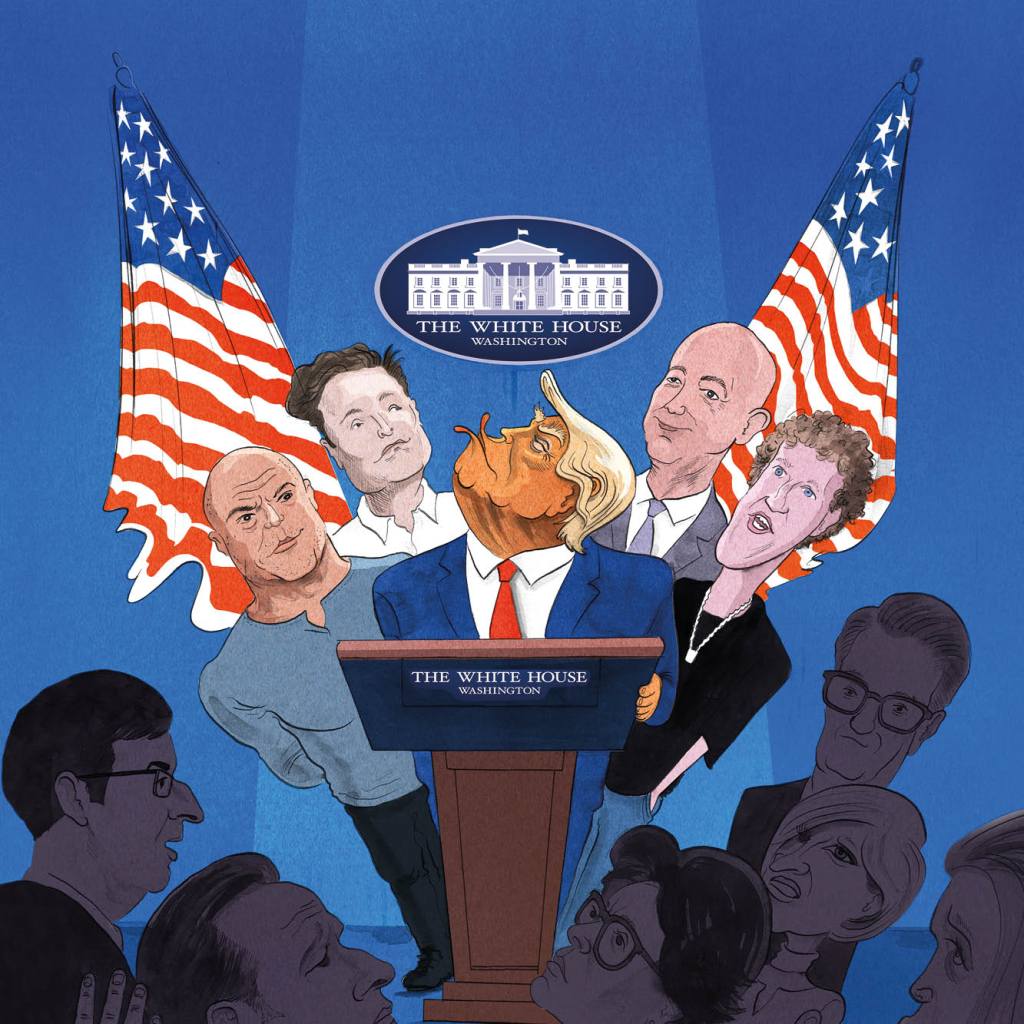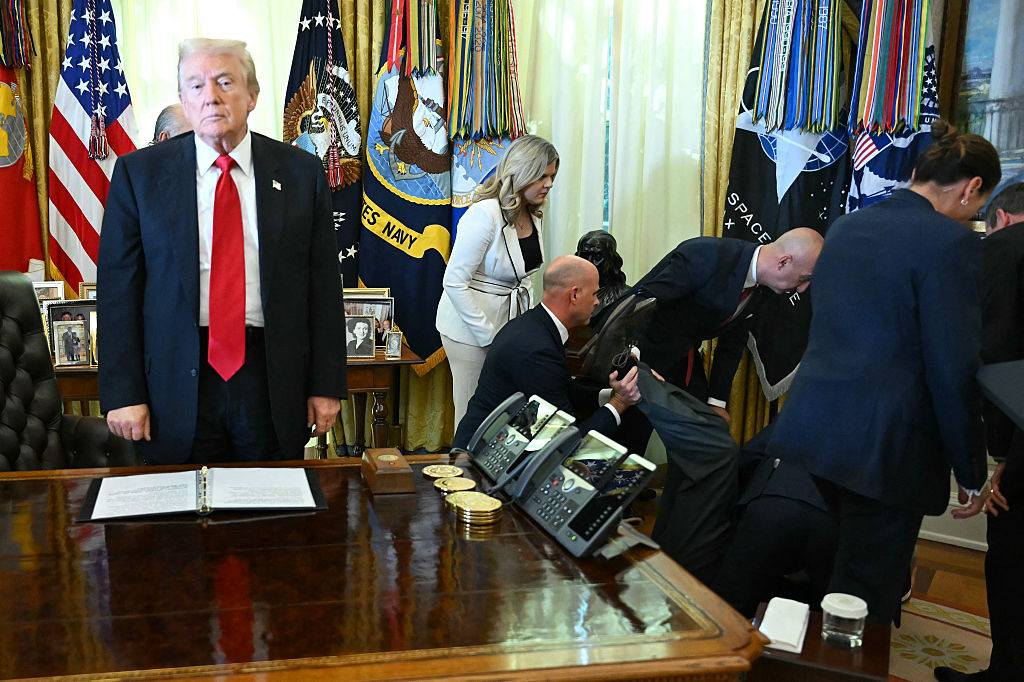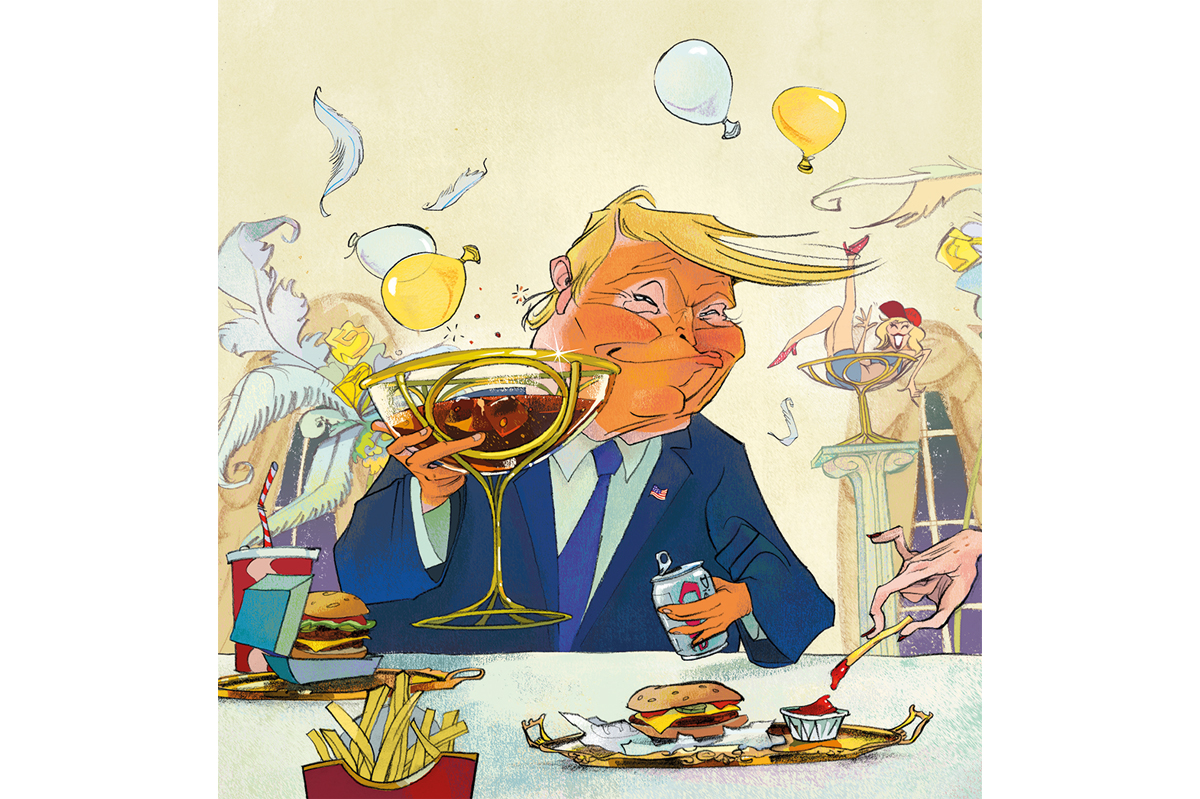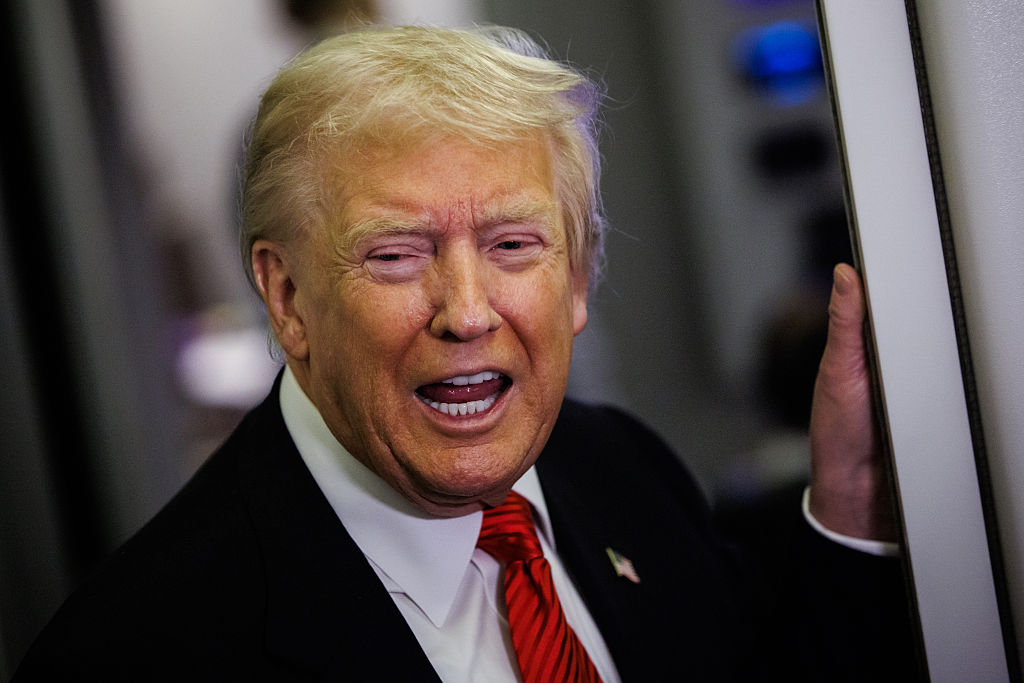It was nearly 2 a.m. on the East Coast in the middle of election night when CNN’s Jake Tapper stood across from professional virtual-map operator John King and asked a simple question: “Are there any places where Kamala Harris overperformed from where Biden did?”
Tapping away from a view of Bucks County, Pennsylvania, King zoomed out to a view of the entire United States and hit a key to show a comparison to the 2020 election. The map instantly turned a solid dark gray, without a single county highlighted.
“Holy smokes,” Tapper gasped. “Literally nothing? Literally not one county?”
“Literally nothing,” was King’s somber reply.
The video, shared widely and instantly on X, has been viewed more than 13 million times. In the final tally, of course, Harris did outperform Biden in a handful of counties — but Tapper’s stunned response in the moment serves as an authentic expression of the media reaction to the 2024 election: utter shock.
It’s a different kind of shock to the system than 2016, though. Then, the possibility that Donald Trump could beat Hillary Clinton was completely discounted. In 2024, media figures were so concerned that he might pull it off after Joe Biden’s disastrous June debate (moderated with steadily increasing disconcertion by Tapper and Dana Bash) that some openly pushed for his replacement, then rushed to aid and abet the Democratic storyline that Kamala Harris had transformed herself into a generational political talent.
It was a desperate move — and it didn’t work. The smarter analysts, even those with a partisan lean, saw the truth written on the wall well before November 5. Unfortunately, precious few of them work in cable news — and with the neutron bomb of Trump’s election victory, there will be even less budget in the industry for their commentary.
The 2016 election flooded the legacy media with attentive new consumers who saw subscribing to the “Democracy dies in darkness” Washington Post as a matter of personal pride. They scrambled to order the rushed #Resistance tomes of anonymous heel-turn staffers and strident Trump critics who feverishly pimped their ghostwritten words on television, podcasts and National Public Radio. But the 2024 election seems to sound the final knell for an industry that managed to hang on well past its prime.
The announcements came rapidly: lay-offs industry-wide jarred legacy institutions. After Jeff Bezos announced that the Washington Post would not be endorsing a presidential candidate, the newspaper lost more than 300,000 subscribers, cut more than 100 staffers and saw a dozen prominent reporters and editors walk — mostly for jobs at the now stridently left-wing Atlantic and the financially secure Wall Street Journal. Some of the biggest names in television suddenly found their contracts on the chopping block, opting for diminished roles or exiting entirely. CBS announced that Norah O’Donnell’s Evening News program, which had some of the most screeching anti-Trump coverage of any broadcast network (including opening a broadcast by suggesting he brought a second assassination attempt upon himself with anti-immigrant rhetoric), would be put on ice after the inauguration. Hoda Kotb left NBC’s Today show after seventeen years, and Andrea Mitchell signed off from the MSNBC program she’d anchored for sixteen. Alisyn Camerota, a ten-year CNN host who gained prominence for challenging the first Trump administration, headed toward the exit as her avowedly anti-Trump colleague Chris Wallace announced a sudden interest in the world of online streaming. Wallace’s representatives made sure to stress that CNN asked him to stay, leaving out the inconvenient fact that it was at a much, much lower price.
Perhaps Wallace’s interest in independence will work out for the seventy-seven-year-old. If 2008 was the Facebook election, and 2016 was the Twitter election, 2024 was the podcast election — when the media witnessed for the first time how much its power had been sapped away, its audiences stolen by more interesting formats as people tired of news chyrons that always begin with “BREAKING.” Today’s consumers want their news uncensored: in bite-sized snippets of video on X, Elon Musk’s everything app; in rebel journalism and truly independent commentary on Substack; or the free-wheeling venue of longform podcast interviews. Donald Trump’s marathon conversations with Theo Von, Andrew Schulz, Logan Paul, Barstool Sports and, of course, Joe Rogan have to be considered a key aspect of his resounding appeal among the young male electorate — the same ones most likely to have cut the TV cord, if they ever had it. And with that shift in eyes and ears comes newfound power for individual hosts and compelling personalities who don’t fit the industry’s demo for pharmaceutical products, retirement plans and walk-in bathtubs. MSNBC and CNBC staffers reacted with shock to the post-election news that Comcast planned to spin off their shrinking cable channels to a new company. Perhaps they should have realized that the digs at 30 Rock run on eyeballs. Good luck on the commute to New Jersey.
The industry-wide legacy-media crack-up is also an ironic consequence of its own bet on its influence over the billionaire class. When dollars started to dry up in the aftermath of the financial crisis and dramatic changes to the advertising-based business model of the Obama years, many media entities were more than happy to look to the mega-rich for succor. Bezos’s quarter billion-dollar purchase of the Post in 2013 and Patrick Soon-Shiong’s half billion-dollar purchase of the LA Times in 2018 were generally viewed as a boon, an example of the civically-minded billionaire class stepping up to bail out financially struggling media organizations. The neoliberal values of Silicon Valley were generally shared with big media’s editorial employees — and they seemed content to let the press do whatever it wanted. It’s fine to be a hood ornament for the billionaires, media executives decided, if it keeps the lights on and pays the overpriced and out-of-touch columnists who built a career on flattering subscribers by never disagreeing with them in the slightest.
Yet there’s always a point where the people who got very rich by paying attention to how it happens take a greater interest in the bottom line — and how much the media disagrees hypocritically with the same free-speech values they claim to uphold. After the eruption of racial strife and the increasingly divisive gender politics during the Covid pandemic, owners of media companies discovered that funding all these salaries, promising millions to diversity, equity and inclusion agendas, and even tolerating calls for censorship did not serve to purchase indulgences from the loudest people in the newsroom or the HR department. Owners tired of the assumption that they existed to fund the work of people they no longer viewed as worth supporting. And they became increasingly open to the idea there could be no profit or peace in funding the creaky voice of the entrenched illiberal left.
Elon Musk’s $44 billion purchase of Twitter in 2022 started the cascade. A mega-purchase that began almost as a joke turned into a historically transformative event, not just for American politics but for worldwide media and culture. Musk’s decision-making style didn’t just drive away the media’s “blue check” elites howling about loss of influence and the rise of “misinformation,” it pushed the Overton Window on the possibilities super-rich tech men (and yes, they are all men, Mackenzie Scott and Laurene Powell Jobs didn’t build that) could consider despite the braying of the legacy news horde.
The Obama-Biden Democrats assumed they would have the fealty of this cohort, thinking the arrangement — you pay to fund our “woke” liberal policies, and pay the tenured editorialists and midwit commentators who espouse them; in exchange we give you the soft regulatory touch and Wall Street-boosting policies that let your wealth grow to immense proportion — was to everyone’s benefit. (Everyone, it turned out, but the American worker… and American security… and traditional American culture.) But the far left became increasingly emboldened and aggressive. During the pandemic, when they pushed for steps that made these leaders of industry decidedly uncomfortable, it became unavoidably clear: a new deal was in order. This time around, the tech executives from Google, Apple, Meta and more wouldn’t just meet with Trump, they’d seek to influence him. And they’d respond to the new reality by putting loud illiberals back in their place, daring them to post their principled walkouts on Bluesky.
Last October, when Bezos and Soon-Shiong separately made clear that their newspapers wouldn’t be endorsing Kamala Harris, the media reacted with the measured restraint of a pro-Hamas protester dousing himself in kerosene and flicking on a lighter. Editorial board members, editors and columnists announced their defiant resignations. (The Post’s Jennifer Rubin, who repeatedly hailed the LA Times resignations and demanded to know why others had not joined them, experienced a sudden change of heart and decided the world could ill afford her committing career seppuku at such a challenging moment.) Kara Swisher, the aviator-clad advocate for ever-increasing Silicon Valley censorship, announced she was seeking an alternate group of rich investors to help her buy the Post and save it from Bezos’s clutches. No word on if she had any takers — besides the fact that Bezos has shown no interest in selling. Instead, Amazon is spending $40 million for the rights to Melania Trump’s bio — to be directed by Brett Ratner, back again after the end of #MeToo.
Swisher isn’t alone in letting the new reality get the best of her. Thanks to remarks by George Stephanopoulos, ABC’s chief political anchor and Good Morning America co-host, ABC announced post-election that it would pay $15 million in response to a defamation suit from Trump — money they said would go to help fund his presidential library. (Perhaps it will build a wing on his relationship with the media.) There’s still a lawsuit pending against CBS News over a deceptively edited interview with Kamala Harris broadcast on 60 Minutes, though no word on if they’ll settle in court or settle for the outskirts of covering the administration for the next four years.
Yet if Swisher’s approach to the media shift and Trump’s victory is the bonkers end of the desperation scale, and ABC’s apology is a middle course of grudging surrender, the more diplomatic end is found in the married hosts of MSNBC’s most grandiloquent show: Morning Joe, whose Mika Brzezinski and Joe Scarborough rushed to Mar-a-Lago to pledge their loyalty to their new Trumpian overlords. “Joe and I realized it’s time to do something different… and that starts with not only talking about Donald Trump, but also talking with him,” Brzezinski announced, citing her diplomat father Zbigniew Brzezinski for speaking “with world leaders with whom he and the United States profoundly disagreed.”
Of course, that positioning is utterly inauthentic — so perhaps a better example of a media maven who learned the lessons of the past few years is Meta’s Mark Zuckerberg, who switched from running to mixed martial arts and Brazilian jiujitsu during the pandemic. It turns out a few years in that based subculture was all it took to make someone who could once speak the language of corporate Democratic neoliberalism fluently to audiences from Aspen to Davos sound completely different. Announcing an end to Meta’s media-funding fact-checking project that involved “too many mistakes and too much censor- ship,” Zuckerberg committed to working with President Trump to push back on censorship regimes in China, Europe and Latin America. “It’s been so difficult over the past four years,” he said, frustration written on his face, “when even the US government has pushed for censorship.”
Zuckerberg’s half right: it wasn’t just the government — it was the media themselves, who pressed for the silencing of those who dared to disagree with them or their agenda. They wanted to be unassailable, and they were willing to wield the ring of power to that purpose. They got away with it at first, but that’s what 2024 corrected: it has at long last forced America’s dying media elite to realize the power to silence has slipped from their grasp — hopefully, for good.
This article was originally published in The Spectator’s February 2025 World edition.























Leave a Reply